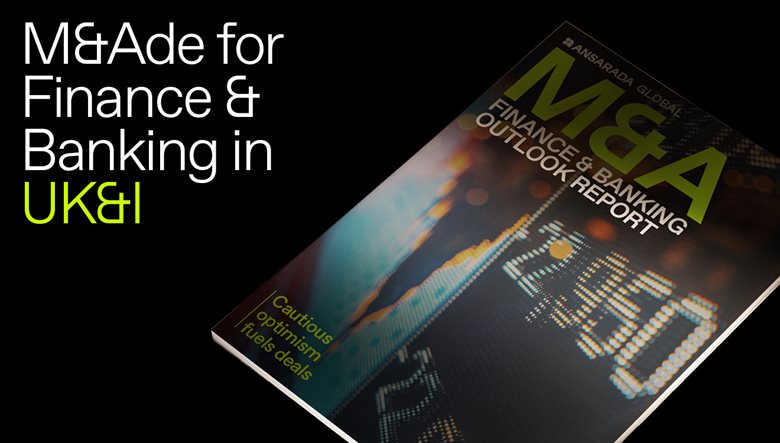Resilience and strategic positioning driving finance and banking M&A in the UK&I
The United Kingdom and Ireland's finance and banking M&A market has demonstrated resilience and adaptability, emerging from a challenging post-Brexit adjustment period with renewed momentum and strategic clarity.
By AnsaradaTue Jul 01 2025Mergers and acquisitions, Industry news and trends, Innovation

According to data from our 2025 Global Finance & Banking M&A Outlook Report, while the region initially experienced headwinds with a 55% quarterly decline in deal room activity and a 24% year-on-year decrease in new deals, the broader picture reveals a compelling recovery story. When viewed through a longer-term lens, the market has demonstrated exceptional strength with 64% growth when comparing the most recent 12-month period to the previous comparable year.
This recovery trajectory becomes even more impressive when considered against the backdrop of the region's complex post-Brexit adjustment period and ongoing economic uncertainties. These challenges have required financial institutions to fundamentally reassess their business models and strategic positioning, ultimately leading to a more focused and purposeful approach to growth.
The strength of this strategic recalibration is evident in the market data: according to EY, UK banks, insurers and asset managers publicly disclosed 380 M&A deals in 2024, representing the highest annual volume since 2012 compared to 272 deals in 2023. This surge demonstrates not just the market's underlying vitality, but its renewed strategic focus on growth and transformation.
Post-Brexit market adaptation
Regulatory divergence creating new opportunities
The UK's regulatory independence from EU frameworks has emerged as a significant strategic advantage, creating substantial new opportunities that meaningfully differentiate the region from continental European markets. Rather than viewing regulatory divergence as a constraint, sophisticated financial institutions are leveraging regulatory arbitrage opportunities between UK and EU jurisdictions to optimise their operational structures and compliance costs while maintaining crucial market access across both regions.
This regulatory flexibility has proven particularly attractive to the fintech sector, where the UK's fintech-friendly regulations are drawing substantial international investment. The country's positioning as a leading destination for financial technology innovation and development has created a virtuous cycle, where regulatory clarity attracts investment, which in turn drives innovation and further regulatory refinement.
Deal activity and transaction patterns
Insurance sector leading the charge
The UK's financial services industry has demonstrated remarkable activity levels, with 82 M&A deals announced in Q3 2024 alone, representing a total value of $2.3 billion according to GlobalData's Deals Database. The standout transaction was the $1.7 billion acquisition of Coats Group by Pension Insurance Corporation, which not only represented the industry's largest disclosed deal but also highlighted the sector's capacity for transformative transactions that fundamentally reshape competitive dynamics.
The pension risk transfer market, in particular, is experiencing accelerating consolidation as regulatory changes intersect with demographic trends to create substantial growth opportunities for specialised providers. This convergence has led to specialty insurance lines attracting premium valuations, as investors increasingly recognise both the defensive characteristics and growth potential of niche insurance products. Meanwhile, the integration of insurtech solutions is driving digital transformation deals, as traditional insurers actively seek to modernise their customer engagement and operational capabilities to remain competitive.
Banking sector rationalisation continues
UK banking M&A activity reflects the ongoing evolution of the sector as institutions continue adapting to post-Brexit realities while responding to rapidly changing consumer expectations. Regional bank consolidation has gained momentum as smaller institutions recognise the critical importance of achieving scale advantages necessary for sustainable profitability in an increasingly competitive and regulated environment.
Simultaneously, the maturation of challenger banks is creating attractive exit opportunities for early investors, as these institutions have reached sufficient scale to attract strategic acquirers looking to rapidly expand their market presence. This dynamic has created a particularly active segment of the M&A market, where established players can acquire proven business models and customer bases rather than building from scratch.
Wealth management sector expansion
The wealth management sector has emerged as a particular area of strength, driven by favorable demographic trends and growing affluence that continue creating substantial demand for sophisticated investment advisory services. The sector's evolution is perhaps most visible in the wave of robo-advisor acquisitions by traditional wealth managers, reflecting the industry's growing recognition that technology-enabled advice delivery has become essential for serving younger, more digitally-oriented customers.
These technology-driven acquisitions are part of a broader trend toward platform business combinations, which are creating significant scale advantages as institutions seek to reduce costs and improve service delivery through integrated technology solutions. Adding another layer of complexity and opportunity, ESG-focused investment managers are commanding premium multiples as regulatory requirements and investor demand for sustainable investment options continue expanding at an unprecedented pace.
Technology and digital transformation
Fintech ecosystem development drives innovation
The UK's fintech sector continues to be a primary driver of both innovation and M&A activity, reinforcing the country's position as a leading global financial technology hub. The implementation of open banking infrastructure has been particularly transformative, creating entirely new business models that are attracting substantial investment and strategic interest from traditional financial institutions seeking to modernize their service offerings.
Payment innovation, accelerated by PSD2 implementation, continues generating consolidation opportunities as established institutions work to compete with emerging payment solutions that threaten to disrupt traditional revenue streams. The buy now, pay later segment exemplifies this trend, with consolidation accelerating following regulatory clarity as institutions race to capture market share in this rapidly growing consumer finance segment.
Cybersecurity becomes a strategic imperative
Enhanced security requirements are driving substantial consolidation across the broader financial services technology ecosystem, as institutions recognise that cybersecurity capabilities are no longer optional but essential for maintaining customer trust and regulatory compliance. The cyber insurance market, in particular, is experiencing rapid expansion, creating opportunities for specialised providers and strategic acquirers seeking to capitalise on the growing demand for comprehensive cybersecurity protection.
This focus on security is manifesting in accelerated security technology acquisitions, as financial institutions move beyond viewing cybersecurity as a cost center to recognising it as a strategic differentiator that can provide competitive advantages in customer acquisition and retention.
Private equity and alternative capital
Growth capital deployment intensifies
UK private equity firms are demonstrating increased focus on financial services opportunities, recognising the sector's attractive combination of growth potential and defensive characteristics. Growth stage fintech investments are maintaining substantial momentum despite broader market volatility, reflecting investor confidence in technology-enabled financial services that can capture market share from traditional providers.
Traditional banking assets are attracting private capital as investors seek stable, regulated businesses with predictable cash flows and clear improvement potential. Insurance consolidation, meanwhile, is providing attractive returns for private equity investors who can support operational improvements and strategic growth initiatives. Wealth management roll-ups are creating scale players capable of competing more effectively with larger institutional competitors through improved cost structures and enhanced service capabilities.
Pension fund investment patterns evolve
UK pension funds are increasingly making direct investments in financial services companies as they seek higher returns and better alignment with their long-term investment horizons. Infrastructure debt platforms are attracting substantial institutional capital as pension funds seek predictable income streams that match their liability profiles, while private credit strategies are gaining significant pension fund allocation as these investors seek to diversify their portfolios and capture illiquidity premiums.
Real estate finance businesses are receiving strategic investment as pension funds recognise the defensive characteristics and steady returns available in commercial property lending. ESG-aligned investments are driving substantial capital flows as pension funds respond to both beneficiary expectations and regulatory requirements for sustainable investment practices.
International connectivity and cross-border activity
US-UK financial services cooperation deepens
Enhanced cooperation between US and UK regulatory authorities is creating substantial opportunities for cross-border business development and strategic partnerships. Mutual recognition agreements are facilitating cross-border business by reducing regulatory duplication and compliance costs for institutions operating in both markets, while ongoing regulatory equivalence discussions hold the potential to create additional opportunities for market access and operational efficiency.
Innovation partnerships between regulatory authorities are supporting sector growth by enabling coordinated approaches to emerging technologies and business models. Talent mobility agreements are further supporting sector development by enabling financial services professionals to work more easily across both markets, creating a more integrated talent pool that benefits both regions.
2025 outlook and strategic predictions
Short-term market dynamics
Several critical factors will influence immediate transaction activity across the UK and Ireland financial services sector. While general election impacts have created some policy uncertainty, market participants are adapting their strategies while awaiting clarity on regulatory and tax policies that could affect longer-term strategic planning. Interest rate normalisation is improving deal financing conditions by reducing the cost of acquisition capital and improving debt market availability, creating a more favorable environment for larger transactions.
Brexit trade agreement implementations continue to affect business models as institutions adapt to evolving regulatory requirements and market access arrangements. However, rather than viewing these as constraints, many institutions are finding ways to leverage these changes for competitive advantage. Economic growth prospects are influencing strategic planning as institutions assess their expansion opportunities and capital allocation priorities in an environment of cautious optimism.
Long-term structural trends
Several key drivers support sustained M&A activity, including fundamental changes in customer expectations, regulatory requirements, and competitive dynamics. Digital transformation acceleration across all subsectors is creating both defensive and offensive strategic requirements that support continued consolidation activity. Institutions that fail to adapt risk losing market share to more agile competitors, while those that embrace change can capture opportunities for growth and market expansion.
Regulatory modernisation continues creating new business opportunities while requiring institutions to adapt their compliance and operational capabilities. ESG integration requirements are driving strategic combinations as institutions seek to build comprehensive sustainable finance capabilities that meet both regulatory requirements and customer expectations. Global competitiveness needs are supporting scale-building deals as UK and Irish institutions seek to maintain their market positions against larger international competitors.
Looking ahead
The UK and Ireland's finance and banking M&A market has demonstrated exceptional adaptability and resilience throughout the post-Brexit era, successfully navigating complex regulatory changes while maintaining its position as a leading global financial center. The market has clearly found its strategic footing and is building substantial momentum for continued growth and transformation.
The region's unique position bridging EU and global markets, combined with its regulatory innovation leadership and robust fintech ecosystem strength, creates compelling opportunities for strategic consolidation and growth-focused transactions.
Financial institutions that can effectively navigate the evolving regulatory landscape while capitalising on technology trends and international connectivity opportunities will be best positioned to succeed in this dynamic and rapidly changing market environment.


